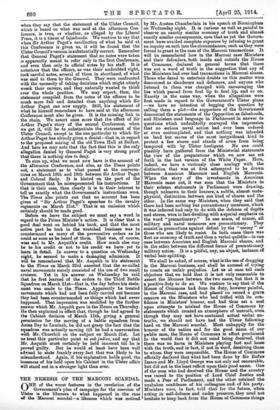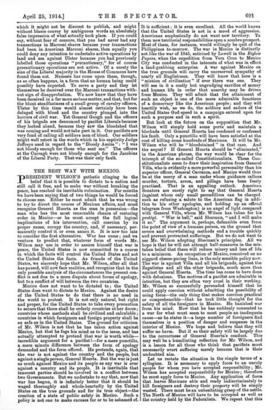TICE NEMESIS OF THE MARCONI SCANDAL.
ONE of the worst features in the revelation of the Government's plan of campaign for the coercion of Ulster is the likeness to what happened in the case of the Marconi scandal—a likeness which was noticed by Mr. Austen Chamberlain in his speech at Birmingham on Wednesday night. It is curious as well as painful to observe an exactly similar economy of truth and almost exactly similar consequences, save that as yet the Govern- ment have avoided complete exposure by refusing to grant an inquiry on oath into the circumstances, such as they were forced to grant in the case of the Marconi transactions. It will be remembered how in the Marconi case Ministers and their defenders, both inside and outside the House of Commons, declared in general terms that there was not a word of truth in the suggestion that any of the Ministers had ever had transactions in Marconi shares. Those who dared to entertain doubts on this matter were denounced as slanderers and defamers, and anyone who listened to them was charged with encouraging the lies which passed from foul lip to foul lip, and so on. Exactly in the same way, when the allegations were first made in regard to the Government's Ulster plans —we have no intention of begging the question by calling them a plot—the supporters of the Government denounced the statements of the Opposition as falsehoods, and Ministers used language in Parliament in answer to questions which undoubtedly conveyed the impression that no serious naval action had ever been ordered. or even contemplated, and that nothing was intended on land but moves of the most insignificant kind to protect a few stores and stands of arms from being tampered with by Ulster hooligans. No one could possibly have gathered from the Ministerial statements the view of the preparations which we now see set forth in the last version of the White Paper. Here, indeed, we have a curiously close analogy with the distinction that was at first attempted to be drawn between American Marconis and English Mareonis. When the story of the investments in American Marconis came out, it was seen that the Ministers in their solemn statements in Parliament were drawing, though unknown to their hearers, a subtle, almost meta- physical, distinction between one kind of shares and the other. In the same way Ministers, when they said that there had been nothing but precautionary measures, which it was inferred had only to do with the defence of depots and stores, were in fact dwelling with a special emphasis on the word "precautionary." In one sense, of course, all military and naval measures are precautionary. They consist in precautions against defeat by the " enemy " or those who are likely to resist. In both cases there was first an economy of truth and then a verbal quibble—in one case between American and English Marconi shares, and in the other between the different forms of precautionary military action. It is a pitiful, nay, an abject, instance of verbal hair-splitting.
We shall be asked, of course, what is the use of dragging in the Marconi business, and shall be accused of trying to create an unfair prejudice. Let us at once tell such objectors that we hold that it is not only reasonable to assert the likeness between the two cases, but that it is a positive duty to do so. We venture to say that if the House of Commons had done its duty, however painful, in the Marconi case, and had placed en record a grave censure on the Ministers who had trifled with its con- fidence in Ministers' honour, and had thus set a seal upon attempts to mislead the House of Commons by statements which created an atmosphere of untruth, even though they may not have contained actual verbal un- truths, we should not have had the Ulster following hard on the Marconi scandal. Most unhappily for the honour of the nation and for the good name of our public men, the House of Commons in effect proclaimed to the world that it did not mind being deceived, that there was no harm in Ministers playing fast and loose with the truth, and in fact, if not in word, deceiving those to whom they were responsible. The House of Commons officially declared that what had been done by Sir Rufus Isaacs and Mr. Lloyd George was not only not censurable, but did not in the least reflect upon their good name. One of the men who had deceived the House and the country was raised to the position of Lord Chief Justice and made a Peer of Parliament, and the other retained the unshaken confidence of his colleagues and.. of his party. Ministers were, in fact, told that for the future, when acting in self-defence and under- pressure, they need not hesitate to keep back from the House of Commons things.
which it might not be discreet to publish, and might without blame convey by ambiguous words an absolutely false impression of what actually took place. If you could say, without fear of censure, that you had never had any transactions in Marconi shares because your transactions had been in American Marconi shares, then equally you could deny any intention to undertake active operations by land and sea against Ulster because you had previously labelled those operations " precautionary," for of course precautionary operations are not active. Of a surety the sins of the Liberal majority in the House of Commons have found them out. Nemesis has come upon them, though, as so often happens, in a form that no human being could possibly have expected. To serve a party end they let themselves be deceived over the Marconi transactions with- out sign of disapprobation. We now know that they have been deceived in a far more serious matter, and that, but for the blunt steadfastness of a small group of cavalry officers, Ulster by this time would almost certainly have been deluged with blood and the country plunged into the horrors of civil war. Yet General Gough and the officers of his brigade are denounced by pacifist Liberals because they looked ahead, because they saw the bloodshed that was coming and would not take part in it. Our pacifists are very fond of calling all soldiers men of blood. Our soldiers might well retort in the words which in his captivity Judge Jeffreys used in regard to the "Bloody Assize " : "I was not bloody enough for those who sent me." The officers at the Curragh were not bloody enough for the Jacobins of the Liberal Party. That was their only fault.



























































 Previous page
Previous page